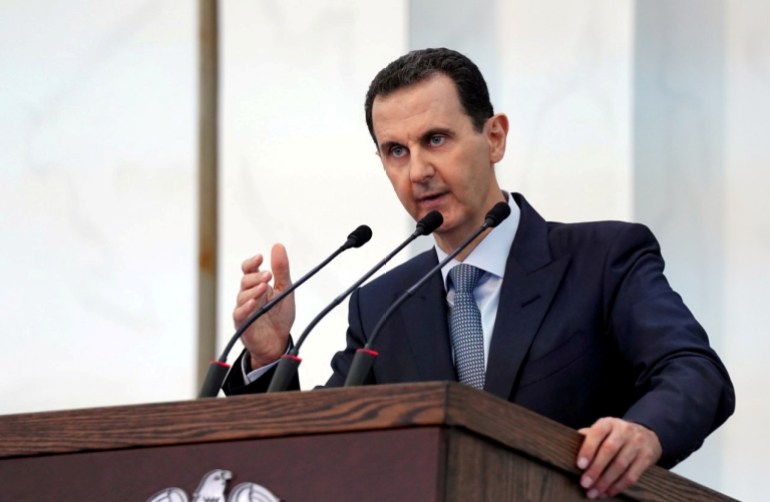Rare anti-government protest turns deadly in southern Syria
Demonstrators are angry with the Assad government over rising prices, power cuts, food and fuel shortages.

At least two people have been killed, including a policeman, when protesters in the southern Syrian city of Sweida stormed a provincial government building in a rare anti-government protest over rising prices and other economic hardships.
The activist media collective Suwayda 24 and the Syrian Observatory for Human Rights, a UK-based monitoring group, confirmed the two deaths on Sunday and said four people were taken to hospital with gunshot wounds in the Druze-majority city.
Keep reading
list of 4 itemsIsraeli air attacks in Syria kill four soldiers, wound one
Fears in Syria’s Azaz as threat of conflict rises once again
Ibrahim Kalin: What’s the extent of Turkey’s operation in Syria?
Suwayda24 posted images on social media that showed dozens of protesters calling for the fall of the regime as security forces stood guard outside the building.
Other images showed a military vehicle on fire and tyres burning on main streets of the city.
“There is a large deployment of security forces in the area, and you can still hear gunshots,” Rayan Maalouf, who heads the Suwayda 24 collective, told The Associated Press.

The Syrian interior minister said in a statement that the people who raided the building were armed and destroyed furniture, smashed windows and looted files. The statement said a “group of outlaws” killed one policeman as they tried to storm police headquarters.
State television said “lawbreakers” had stormed the provincial government building and “set fire to official documents and files”.
Rare anti-government protest
Anti-government demonstrations are rare in Syria, where President Bashar al-Assad stamped out a pro-democracy uprising more than a decade ago. Nearly half a million people have been killed and half the country’s population has been displaced since the peaceful uprising in 2011 evolved into a bloody war.
Assad has survived, but the conflict has plunged Syria into poverty. Its people also face food and energy shortages.
Although the province of Sweida, which borders Jordan, has generally been spared the worst of the war, tensions have been simmering between residents and the Assad regime, and anti-corruption protests have occurred there over the past few years.
Syria’s economy has been pummelled by both its long-running war and Western sanctions against Damascus, and the value of the Syrian pound has plummeted.

Sweida and other cities have been hit hard by nationwide electricity rationing and chronic fuel shortages that severely impact daily life. The government in recent days announced further austerity measures, including more electricity rationing.
Ninety percent of the population now lives below the poverty line and 12.4 million people don’t have enough to eat, according to the United Nations.
In February, hundreds of people protested in Sweida to demand better living conditions and democratic rule, the Syrian Observatory for Human Rights said at the time. Smaller protests were held there in 2020.
Nashaat al-Atrash, a Druze legislator in the Syrian Parliament condemned protesters for raiding the provincial building and called for calm.
“All of Syria is going through an economic crisis,” he said on Syria’s Al-Ikhbaria television, claiming that outside forces could be trying to stoke tensions through the demonstrations.
